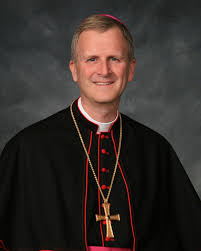 With Americans facing an upcoming presidential election featuring two of the most unpopular candidates in the nation’s history, Bishop James V. Johnston of the Diocese of Kansas City-St. Joseph, Missouri, encourages Catholic to look at the bigger picture when deciding how to vote.
With Americans facing an upcoming presidential election featuring two of the most unpopular candidates in the nation’s history, Bishop James V. Johnston of the Diocese of Kansas City-St. Joseph, Missouri, encourages Catholic to look at the bigger picture when deciding how to vote.
The Catholic Key published a letter from Bishop Johnston which encourages the faithful to exercise their duty as a Christian citizen by voting.
“This year is very unusual in that the two main candidates for president are so obviously flawed and viewed unfavorably by a majority of the country. Many are discouraged and some have told me they may not vote because they so dislike both candidates. I believe this is a serious mistake. At the very least, we should vote to choose the candidate that we believe will do the least damage.”
In order to do this, however, a Catholic needs to know that not all issues have a moral equivalency. As the USCCB’s explains in Faithful Citizenship, “In making these decisions, it is essential for Catholics to be guided by a well-formed conscience that recognizes that all issues do not carry the same moral weight and that the moral obligation to oppose policies promoting intrinsically evil acts has a special claim on our consciences and our actions.”
The same document clearly states that “Some issues involve principles that can never be abandoned such as the fundamental right to life and marriage as the union of one man and one woman.”
 This is why we are taught to weigh each candidate and determine how the election of each will influence the most critical issues.
This is why we are taught to weigh each candidate and determine how the election of each will influence the most critical issues.
Bishop Johnston goes on to remind voters that they need to consider much more than just the individual candidates.
“I encourage you to consider not simply the candidates, but whom they will bring with them to help them lead, and whom they will appoint to key posts of responsibility. We often get bogged down with the politics of personality and lose sight of the fact that we are electing an administration of thousands of other appointments that will affect our future.”
The most crucial appointments that will come along with this year’s election are those concerning the justices of the Supreme Court.
“It could be argued that bad Supreme Court decisions have done more damage to the fabric of American life than any president. The Roe vs. Wade decision of 1973, and the subsequent Court decisions reinforcing it have done more to poison and divide America than anything in our history since slavery. The next president could possibly appoint as many as three new justices that will shape America over the next two to three decades.”
But Supreme Court judges aren’t the only ones who can cause tremendous damage to the moral fabric of America.
“ . . . [P]residents appoint judges at the other levels of the judiciary; these too have profound impacts (for good or ill) on our common life,” the bishop writes. “We should not forget that many states (including California) held referendums to protect the sanctity of marriage as a union between one man and one woman. These decisions by the states were overturned by judges as unconstitutional, radically altering the culture of America for years to come.”
Besides judges, the president also appoints other government officials that wield great power, Bishop Johnston reminds.
“These people have the potential to create great mischief and severely punish citizens. A case in point is the Department of Health and Human Services (HHS) and its treatment of the Little Sisters of the Poor and other similar groups who simply asked the government to find another way to deliver abortion inducing drugs and contraceptives to those who desire them, and to be exempted from violating their consciences by being forced to include them in their health plans. This case is still not resolved, and it serves as an example of how a presidential election is about more than one person. It is about the many other persons the president appoints to positions of power.”
In the end, the Christian voter must rely on the virtue of prudence to make the right choices when faced with a decision about how to vote.
“Prudence enables us ‘to discern our true good in every circumstance and to choose the right means of achieving it’ (Catechism of the Catholic Church, no. 1806). It helps us deliberate over alternatives, sometimes complex, and to choose the most fitting one in a specific context,” the bishop writes.
Click here for more guidance on exercising our duty to vote.
© All Rights Reserved, Living His Life Abundantly®/Women of Grace® http://www.womenofgrace.com









